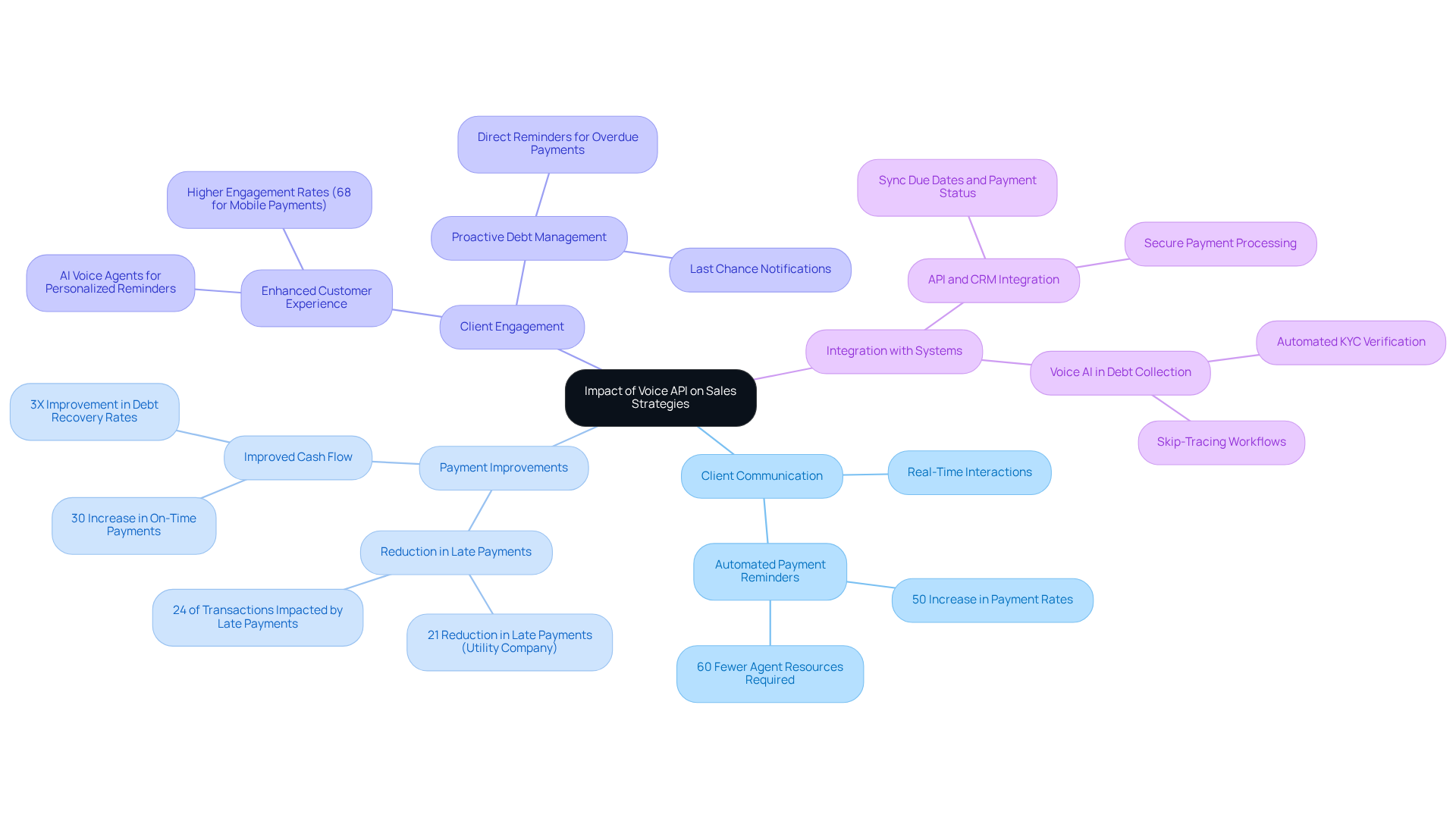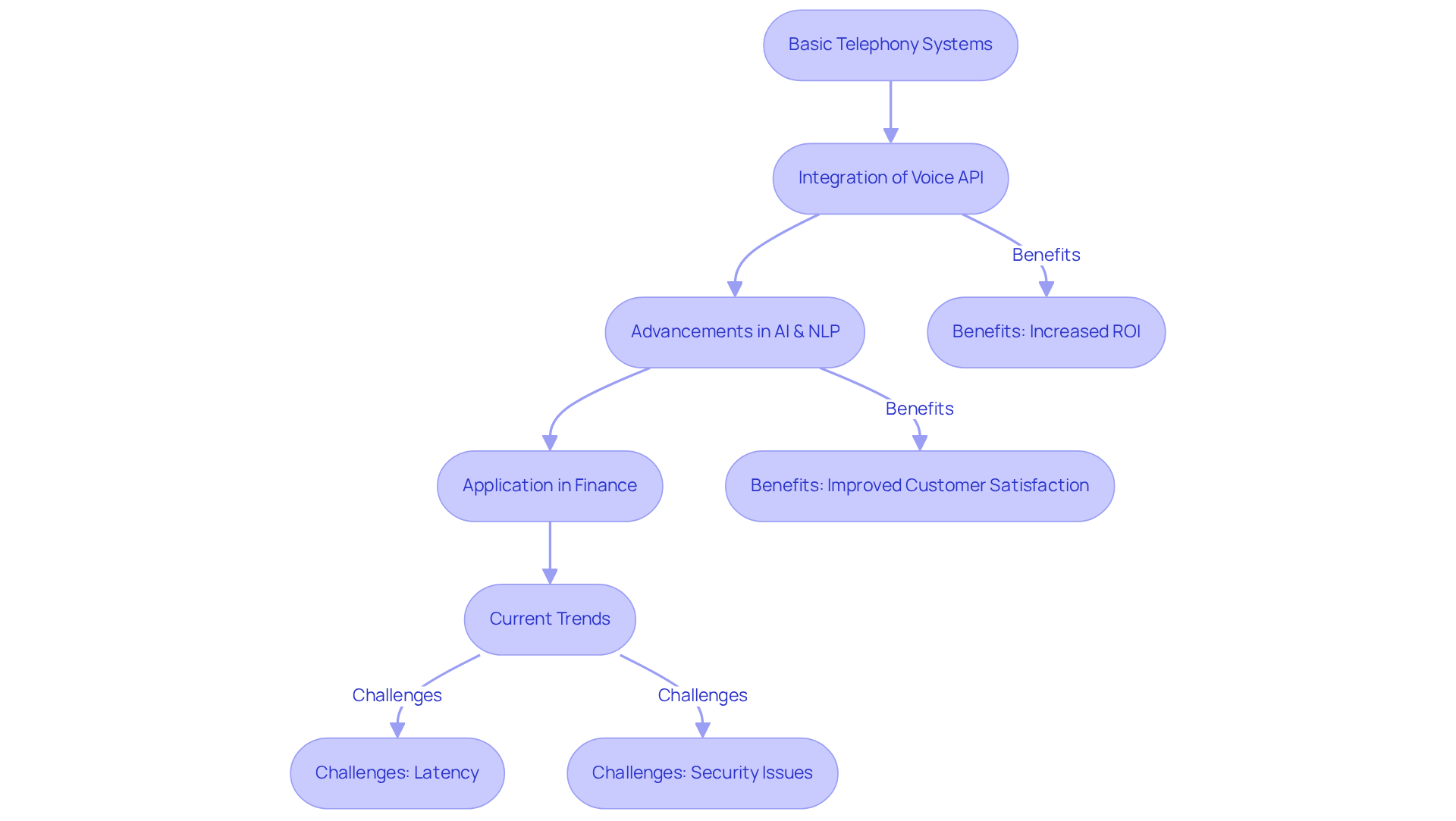Overview
This article examines the transformative impact of Voice API technology on sales strategies within the finance sector. By enhancing communication and automating processes, this technology is revolutionizing how financial institutions operate.
Key advancements in voice interfaces are highlighted, demonstrating their role in:
- Improving lead qualification
- Increasing payment rates
- Streamlining customer interactions
As a result, organizations are witnessing significant enhancements in operational efficiency and revenue generation. The integration of Voice API technology not only optimizes workflows but also positions finance professionals to engage more effectively with clients, ultimately driving growth and success in a competitive landscape.
Introduction
Voice APIs are revolutionizing the way businesses, particularly in the finance sector, engage with their clients. By automating voice interactions, these advanced technologies not only streamline communication but also significantly enhance sales strategies. This leads to improved customer satisfaction and increased revenue. However, as organizations rush to adopt these tools, a pressing question arises: how can they effectively navigate the challenges of implementation while maximizing the transformative potential of voice APIs?
Define Voice API: Core Concepts and Functionality
An Audio API (Application Programming Interface) represents a sophisticated set of protocols and tools that empowers developers to embed speech communication functionalities into applications. This technology is pivotal for businesses aiming to automate voice interactions using a voice API, which includes making calls, sending voice messages, and processing voice commands. In the sales sector, voice interfaces significantly enhance communication between companies and clients, facilitating automated processes such as lead qualification, payment reminders, and client support. By leveraging advanced machine learning and natural language processing, audio interfaces enable human-like interactions that greatly improve user engagement and increase conversion rates.
Recent advancements in voice API technology have further refined these capabilities, allowing for more intuitive and responsive interactions. For instance, businesses in the finance industry have effectively incorporated audio interfaces to enhance service efficiency and reduce operational expenses. The existing market for voice API technology is growing swiftly, driven by the rising demand for automated solutions that enhance user experiences and optimize transaction processes. As organizations continue to adopt these advancements, the potential for vocal interfaces to revolutionize customer interactions becomes increasingly apparent.

Contextualize Voice API: Impact on Sales Strategies
Voice interfaces have fundamentally transformed sales tactics by automating and streamlining client communication. In the finance sector, where timely interactions are crucial, the use of voice APIs facilitates real-time communications that significantly enhance lead qualification and client follow-ups.
For instance, automated payment reminders communicated through voice calls ensure clients are promptly informed about their obligations, resulting in a reported increase of up to 50% in payment rates. This proactive strategy not only boosts client engagement but also improves cash flow for businesses, addressing the rising issue of late payments, which impact 24% of transactions in finance.
Furthermore, the ability to analyze voice interactions through real-time analytics empowers teams to refine their strategies, leading to improved performance metrics such as a 30% increase in on-time payments. By leveraging the voice API, financial organizations can effectively manage client relationships and enhance their selling processes, ensuring that every interaction is both timely and impactful.
A compelling illustration of this is GCS, which successfully improved its revenue efficiency by utilizing Intone's customizable AI voice agents. By implementing these agents, GCS enhanced customer engagement and streamlined their communication processes, demonstrating the tangible benefits of leveraging AI voice technology in the fintech space.
Moreover, the integration of audio interfaces with CRMs and payment gateways enhances the overall effectiveness of sales procedures. As Vodex states, "Voice is best for time-sensitive and high-value reminders or where two-way interaction is needed.

Trace the Evolution of Voice APIs: From Concept to Implementation
The development of vocal interfaces is intricately tied to advancements in cloud computing, particularly through the use of voice API and artificial intelligence. Initially, voice communication was limited to basic telephony systems, constraining interaction capabilities. However, as technology progressed, developers began to create interfaces that integrated voice API functionalities into a variety of applications. The advent of natural language processing and machine learning has greatly enhanced speech interfaces, facilitating more nuanced interactions.
Today, voice APIs play a crucial role across various sectors, particularly in finance, where they help streamline complex transaction processes and improve client interactions. Companies like Intone harness this technology to implement AI voice agents that utilize a voice API, allowing them to be effortlessly tailored to meet specific business requirements. The setup process entails uploading scripts, training materials, and call recordings, which are utilized to customize the AI agents for each organization. With features such as smart analytics, Intone's AI agents empower sales teams to establish data sources, enforce call transfer regulations, and generate post-call reports, demonstrating the tangible benefits of voice API in real-world applications. Historical case studies reveal that organizations embracing speech interfaces have experienced marked improvements in operational efficiency and customer satisfaction, with metrics indicating a 250-400% ROI within 12-18 months of AI integration and an average 34% increase in customer satisfaction scores.
Nevertheless, the integration of audio interfaces is not devoid of challenges. Issues such as latency, security, and cross-platform compatibility must be meticulously addressed to ensure seamless functionality. Despite these obstacles, the potential for substantial returns on investment is unmistakable. As the landscape continues to evolve, emerging trends suggest that voice APIs will increasingly incorporate advanced AI features, further enhancing their effectiveness in commercial operations.
Industry experts highlight the transformative potential of voice interfaces, with one asserting, "85% of customer interactions will be managed without human agents by 2025," emphasizing the imperative for businesses to adapt to this technological shift. Intone's AI voice agents leverage voice API technology to be at the forefront of this evolution, delivering enhanced revenue-generating capabilities and fostering financial education, positioning them as indispensable tools for managers in the finance sector.

Identify Key Features of Voice APIs: Capabilities and Benefits
The voice API presents a range of key features, including real-time analytics, smart campaign customization, and seamless telephony integration. Intone's AI voice agents empower businesses to monitor interactions and gather insights into client behavior in real time. This capability enables the development of customized marketing strategies that significantly enhance engagement and conversion rates. By tailoring campaigns, marketing teams can create focused outreach initiatives based on comprehensive client information, ensuring that communications are both pertinent and effective.
The integration of telephony systems with Intone's audio interfaces facilitates a smooth transition to automated speech interactions, thereby enhancing operational efficiency. Businesses are encouraged to submit their use cases, training materials, and call recordings, which allows for the further customization of AI agents to meet specific needs, ensuring optimal performance.
The advantages of integrating this voice API into business processes are considerable. Enhanced conversion rates, improved customer satisfaction, and reduced agent burnout are just a few of the benefits. Notably, Intone's AI voice agents have demonstrated the ability to achieve 1.5 times more conversions compared to traditional human agents. This statistic underscores the transformative potential of this technology in driving sales success.

Conclusion
The transformative power of Voice APIs in the finance sector is undeniable. By integrating advanced voice communication functionalities into sales processes, organizations are witnessing a remarkable enhancement in client engagement and operational efficiency. This technology not only automates critical interactions but also streamlines communication, reshaping the landscape of sales strategies.
Key insights throughout the article highlight how Voice APIs facilitate:
- Real-time interactions
- Improved lead qualification
- Enhanced customer follow-ups
The case studies presented, such as the success of GCS with Intone's AI voice agents, exemplify the tangible benefits of this technology, including:
- Increased payment rates
- Heightened customer satisfaction
Furthermore, the evolution of voice API technology underscores its growing importance in driving sales success and fostering better client relationships.
As businesses continue to adapt to the rapid advancements in voice technology, embracing these tools is essential for maintaining a competitive edge in the finance sector. The call to action is clear: organizations must leverage Voice APIs not merely to enhance their sales processes but also to prepare for a future where automated interactions become the standard. By doing so, they can unlock new levels of efficiency and engagement, ultimately leading to greater success in their financial endeavors.
Frequently Asked Questions
What is a Voice API?
A Voice API is a set of protocols and tools that allows developers to embed speech communication functionalities into applications, enabling features like making calls, sending voice messages, and processing voice commands.
How do Voice APIs benefit businesses?
Voice APIs benefit businesses by automating voice interactions, enhancing communication with clients, and streamlining processes such as lead qualification, payment reminders, and client support.
What technologies are leveraged in Voice APIs to improve interactions?
Voice APIs leverage advanced machine learning and natural language processing technologies to enable human-like interactions, improving user engagement and increasing conversion rates.
How has recent technology impacted Voice APIs?
Recent advancements in Voice API technology have refined capabilities, allowing for more intuitive and responsive interactions, particularly in industries like finance, where they enhance service efficiency and reduce operational expenses.
What is driving the growth of the Voice API market?
The Voice API market is growing swiftly due to the rising demand for automated solutions that enhance user experiences and optimize transaction processes.
What potential do Voice APIs have for customer interactions?
The potential for Voice APIs to revolutionize customer interactions is becoming increasingly apparent as organizations adopt advancements in this technology.






